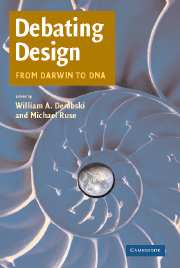Book contents
- Frontmatter
- Contents
- Notes on Contributors
- Debating Design
- INTRODUCTION
- PART I DARWINISM
- PART II COMPLEX SELF-ORGANIZATION
- PART III THEISTIC EVOLUTION
- PART IV INTELLIGENT DESIGN
- 17 The Logical Underpinnings of Intelligent Design
- 18 Information, Entropy, and the Origin of Life
- 19 Irreducible Complexity
- 20 The Cambrian Information Explosion
- Index
- References
20 - The Cambrian Information Explosion
Evidence for Intelligent Design
Published online by Cambridge University Press: 05 June 2012
- Frontmatter
- Contents
- Notes on Contributors
- Debating Design
- INTRODUCTION
- PART I DARWINISM
- PART II COMPLEX SELF-ORGANIZATION
- PART III THEISTIC EVOLUTION
- PART IV INTELLIGENT DESIGN
- 17 The Logical Underpinnings of Intelligent Design
- 18 Information, Entropy, and the Origin of Life
- 19 Irreducible Complexity
- 20 The Cambrian Information Explosion
- Index
- References
Summary
INTRODUCTION
In his book The Philosophy of Biology, Elliott Sober (2000) notes that many evolutionary biologists regard the design hypothesis as inherently untestable and, therefore, unscientific in principle simply because it no longer commands scientific assent. He notes that while logically unbeatable versions of the design hypothesis have been formulated (involving, for example, a “trickster God” who creates a world that appears to be undesigned), design hypotheses in general need not assume an untestable character. A design hypothesis could, he argues, be formulated as a fully scientific “inference to the best explanation.” He notes that scientists often evaluate the explanatory power of a “hypothesis by testing it against one or more competing hypotheses” (44). Thus, he argues that William Paley's design hypothesis was manifestly testable but was rejected precisely because it could not ex-plain the relevant evidence of contemporary biology as well as the fully naturalistic theory of Charles Darwin. Sober then casts his lot with modern neo-Darwinism on evidential grounds. But the possibility remains, he argues, “that there is some other version of the design hypothesis that both disagrees with the hypothesis of evolution and also is a more likely explanation of what we observe. No one, to my knowledge, has developed such a version of the design hypothesis. But this does not mean that no one ever will” (46).
In recent essays (Meyer 1998, 2003), I have advanced a design hypothesis of the kind that Sober acknowledges as a scientific possibility.
Information
- Type
- Chapter
- Information
- Debating DesignFrom Darwin to DNA, pp. 371 - 392Publisher: Cambridge University PressPrint publication year: 2004
References
Accessibility standard: Unknown
Why this information is here
This section outlines the accessibility features of this content - including support for screen readers, full keyboard navigation and high-contrast display options. This may not be relevant for you.Accessibility Information
- 5
- Cited by
